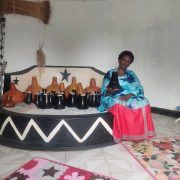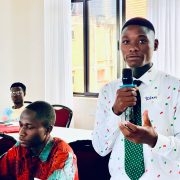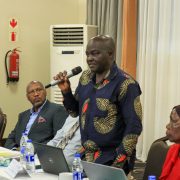CCFU Hosts National Dialogue on Safeguarding Intangible Cultural Heritage
- 6 months Ago
- 0 Comment
- 3 Min Read
Kampala, Uganda – 21 August 2025. Uganda has reaffirmed its commitment to protecting and promoting its diverse cultural heritage through a National Dialogue on the 2003 UNESCO Convention for the Safeguarding of Intangible Cultural Heritage (ICH).
The dialogue, convened by the Cross-Cultural Foundation of Uganda (CCFU) at Hotel Africana, brought together government agencies, civil society organisations, academic institutions, and cultural practitioners. The aim was to deepen understanding of the Convention and identify strategies for strengthening the safeguarding of Uganda’s living traditions.
Uganda ratified the UNESCO Convention in 2009, joining the global framework for the protection of oral traditions, performing arts, rituals, social practices, knowledge systems, and traditional craftsmanship. Since then, six Ugandan organisations, including CCFU, Engabu Za Tooro, Gulu Theatre Artists, the Uganda Community Museums Association (UCOMA), the Pearl Rhythm Foundation, and the National Council of Traditional Healers and Herbalists Association, have received UNESCO accreditation to support its implementation.
Currently, Uganda has one element, barkcloth making, inscribed on the UNESCO Representative List of the Intangible Cultural Heritage of Humanity. Five other elements are listed under the “In Need of Urgent Safeguarding” category: the Madi bow lyre instrument and music, the Empaako naming system, Bigwala music of Busoga, the Male Child Cleansing Ritual among the Langi, and the Koogere Oral Tradition among the Batooro.
Addressing participants, CCFU’s Executive Director, Ms. Barbra Babweteera, stressed that safeguarding ICH is not only a cultural imperative but also a developmental priority.
“Safeguarding our intangible cultural heritage is essential for strengthening identity, ensuring cultural continuity, and contributing to sustainable development. However, challenges such as limited funding, inadequate integration into key sectors, and underutilisation of international mechanisms persist,” she said.
The UNESCO Uganda Office representative, Mr. Charles Drachebo, underscored the role of heritage in addressing contemporary challenges.
“Uganda’s cultural diversity is one of its greatest strengths. Through the 2003 Convention, communities are preserving traditions while also applying them to education, climate change, and livelihoods. UNESCO will continue supporting Uganda in strengthening policies, building capacity, and mobilising resources,” he noted.
Community museums were highlighted as vital spaces for preserving and transmitting heritage. Mr. Abraham Kitawulwa, Chairperson of UCOMA, said that museums provide platforms for storytelling, exhibitions, and intergenerational learning.
“From herbal medicine to traditional music, our community museums ensure that skills and knowledge are not only preserved but remain relevant to younger generations,” he explained.
The dialogue is expected to generate practical recommendations for policymakers, researchers, and practitioners on integrating intangible cultural heritage into Uganda’s national development agenda.
CCFU and Heritage Education
In addition to policy advocacy, CCFU has been advancing heritage education in higher institutions of learning. In 2017, with support from UNESCO, the organisation piloted a three-year project at Kyambogo, Kabale, Uganda Martyrs, and Islamic University in Uganda. The initiative raised awareness among academic leaders on the role of culture in development, leading to the establishment of a Bachelor of Cultural Studies programme, which is now offered in these institutions.
The programme is regarded as a milestone in Uganda’s higher education sector, equipping students with the knowledge and skills to research, safeguard, and promote intangible cultural heritage as part of the country’s broader development agenda.
Policy Implications
Stakeholders at the dialogue agreed that safeguarding intangible cultural heritage requires sustained financial support, policy integration, and stronger community involvement. The Convention provides Uganda with access to international expertise and resources while shifting heritage governance from experts to communities, ensuring that cultural bearers themselves lead in protecting and transmitting their traditions.
For more information about the UNESCO 2003 Convention, read this factsheet.







